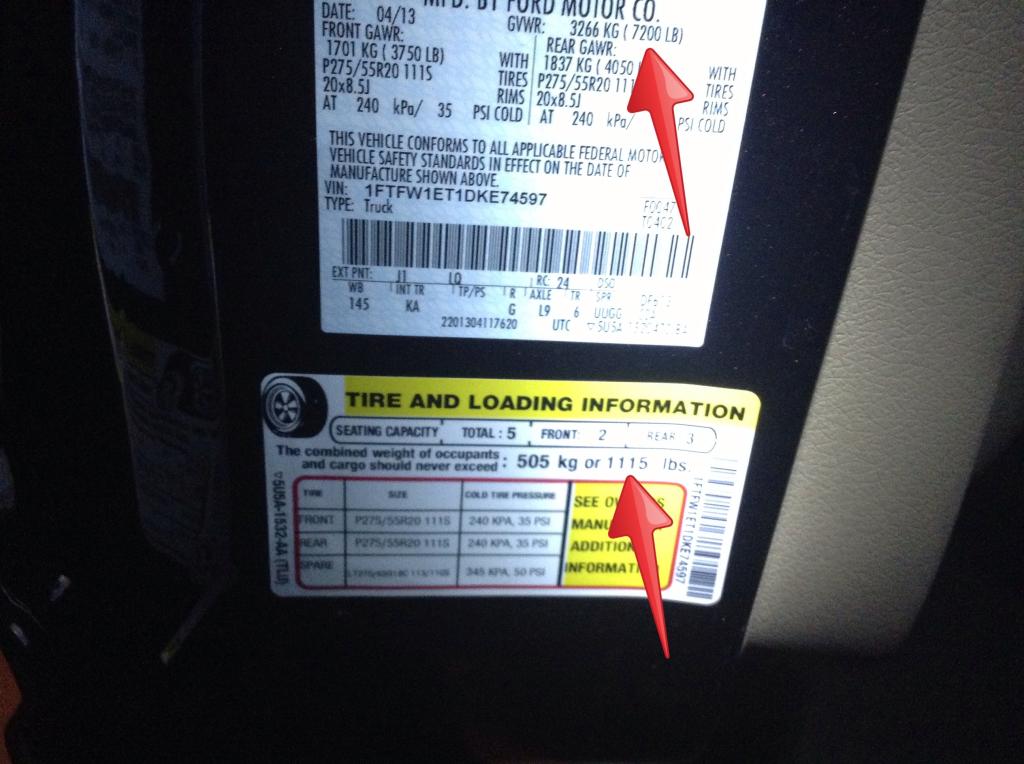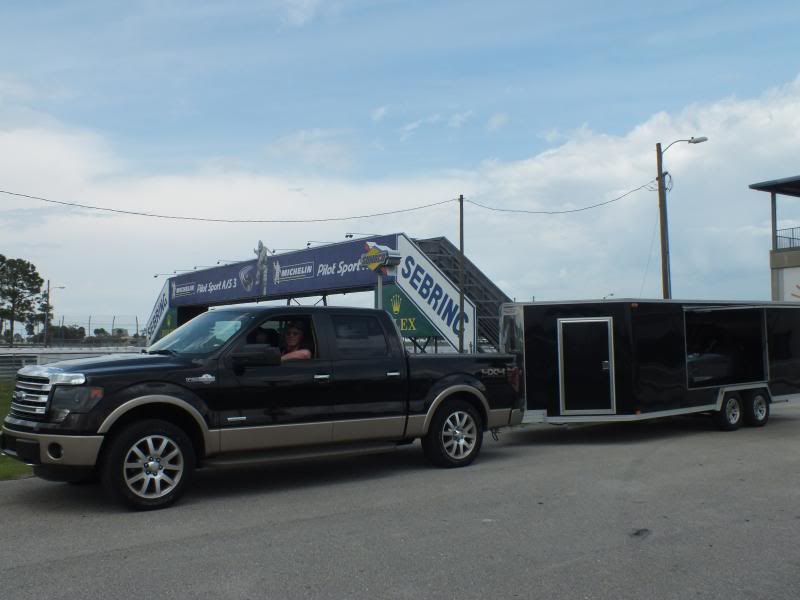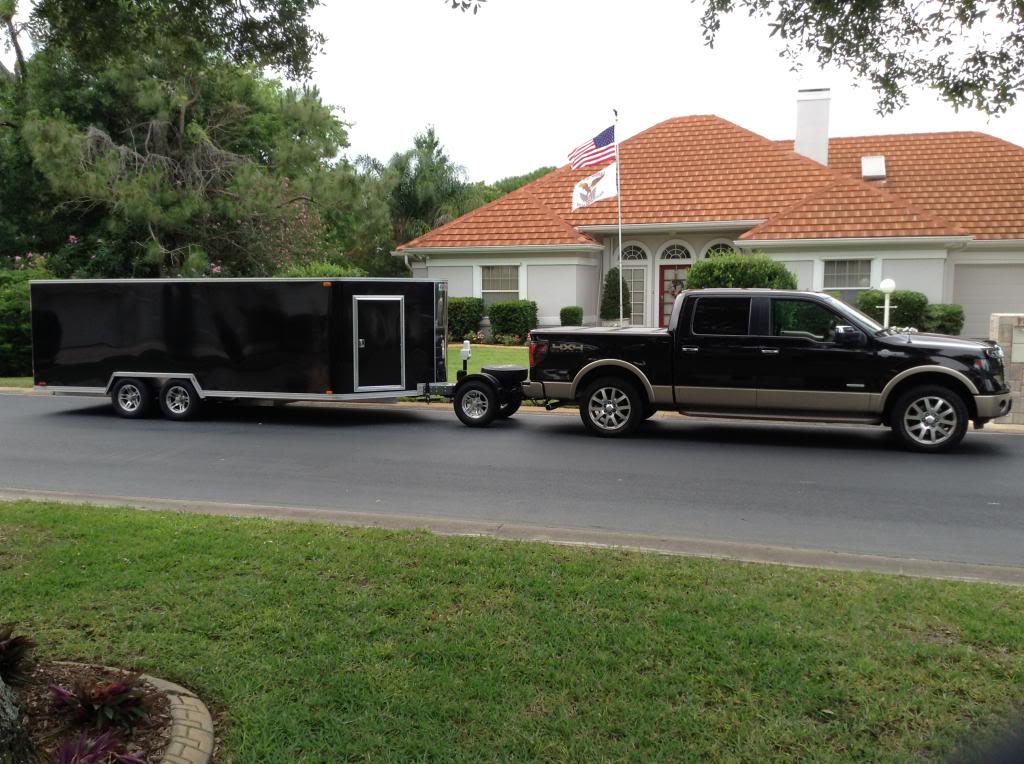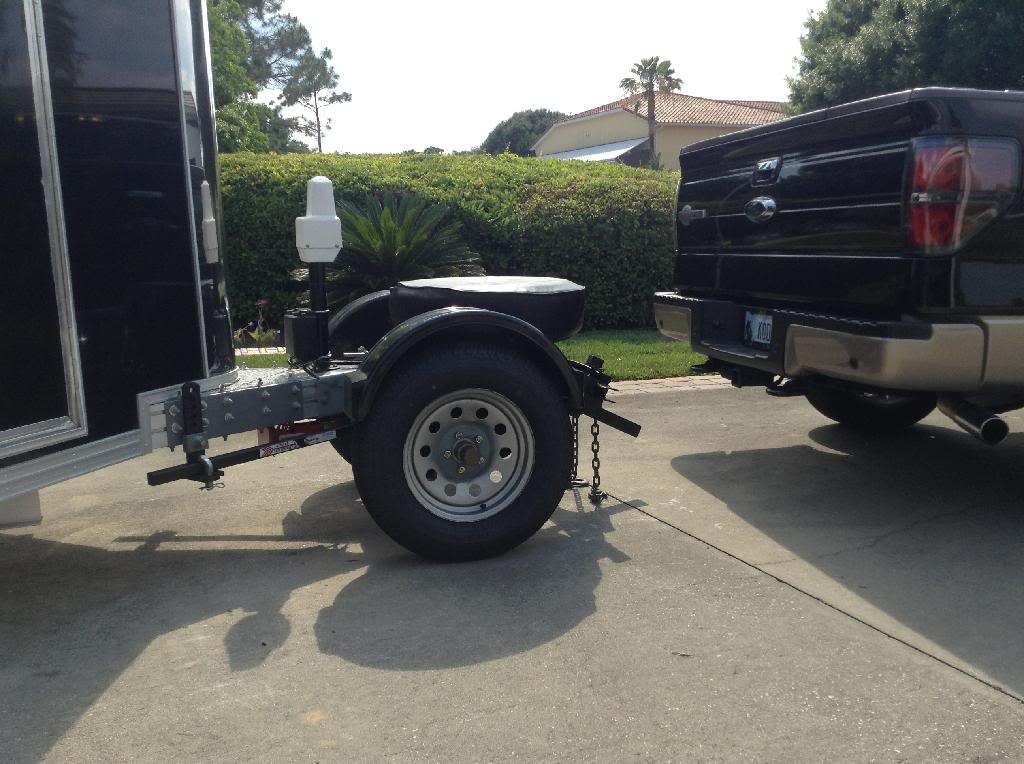Towing loaded car hauler question;
#11
Senior Member
iTrader: (1)
Tell me about it man. I never thought in a million years i'd have issues towing a 6k trailer with my truck... I more or less as asked to ensure I wasn't being dumb... It turns out I was being dumb LOL.
In other news I took a pic of the stickers, kinda low ratings... ****...
In other news I took a pic of the stickers, kinda low ratings... ****...


You can see mine is 1115 lbs, but after I added my drop-in bed liner, bed extender, and BakFlip tonneau I'm down to 1020 lbs!!!

I have a very small enclosed car hauler to drag my Vette to track events. It has a tire rack in the front, and enough room up front of the car to carry a good load of tools, jack, and other track support junk.
Depending on which car I'm hauling and which set of spare wheels/tires, the loaded trailer is 6200 to 6500 lbs, with a 720 to 750 lb tongue weight.
Below is a picture from when I first got the trailer, and I towed 140 miles down to Sebring with no spare tires or tools in the trailer, and I had about 600 lbs of tongue weight:

It towed just fine, but I was overweight with the tail end sagging badly - which lightens up the front wheels and reduces steering and braking effectiveness.
Like you, I thought I got an F150 to tow - why can't it tow a 6000 to 6500 lb trailer????

I'm no lightweight - at least 230 lbs dressed out to drive - and when I load up with my wife, our luggage, and a snack cooler in the cab, and some tools, chairs, umbrella, compressor, etc., in the bed, I've got only maybe 400 lbs remaining for tongue weight!!!
 That's not much of a trailer!!
That's not much of a trailer!!Looking forward to several fairly long-range tows every year, I didn't want to tow like in that picture above. I looked around for a solution and discovered the Trailer Toad.

You can see above that my truck is sitting perfectly level, because there's absolutely no tongue weigh pushing down on the hitch receiver.
I got a used Trailer Toad for $2000 and it totally solved my problem with my wimpy payload capacity. The Trailer Toad carries the ENTIRE tongue weight of the trailer, so all I really need to worry about is GCWR.
Normally when towing you need to be concerned that the load in the truck's cab and bed before hooking up your trailer will leave you enough payload so that when hook up the trailer and add the tongue weight you won't be over the GVWR of your truck.
In my case I can load the truck right up to its GVWR - I can load the entire payload capacity into the cab and bed. Then when I hook up the trailer, because there's no tongue weight transferred to the truck, I can pull up to an 8000 lb trailer - that would put me right up to my GCWR.
Below is the Toad with the trailer hooked up to it, but it's not hooked up to the truck. You can see that the trailer's tongue jack is full retracted, so all the tongue weight is being supported by the Toad. Also, the shank that will go into the truck's hitch receiver is just sagging down - there's no tongue weight on it, so all I have to do is lift it up to insert it into the hitch receiver as I back up.

The Trailer Toad solved the problem of my truck's very limited payload capacity. I've towed about 5000 miles with it now and it has worked perfectlyl
.
Last edited by KR Kodi; 06-05-2015 at 04:30 PM.
The following users liked this post:
McCarthy (06-05-2015)
The following users liked this post:
xcntrk (06-06-2015)
#13
Grumpy Old Man
Wrong. You have plenty of power to PULL that weight, but you probably don't have enough payload capacity to HAUL the normal load of people and stuff as well as the hitch weight of a properly-loaded trailer that grosses 5,800 pounds.
My F-150 has a tow rating of 8,400 pounds, but I'm overloaded over the GVWR of my pickup when towing my small travel trailer that grosses only 4,870 pounds when wet and loaded for the road.
however my question is this; I have the hitch and trailer brake as installed from the factory, is that safe to use with that weight?
I keep hearing weight distributing hitch thrown around, do I need one, and by any chance did my truck come with one?
New WD hitches are available from on-line discount sources such as Amazon.com or eTrailer.com for a little as $200. But you don't want a cheap WD hitch. Instead you want one with good sway control built in and that retails for around $1,000 and is available from discount on-line sources for $500 to $600. The good ones include:
☺Reese Strait-Line trunnion bar
☺Husky CenterLine
☺Blue Ox SwayPro
☺Equil-I-Zer
Reese and Husky also make the cheap hitches, so if you buy one of those brands be sure it is a Strait-Line or CenterLine.
#14
Senior Member
With a 5 or 6k lb trailer on any f150, I'd just hook and go. No need for a wd hitch on an open trailer at that weight. And being a little over on tongue weight is also a non issue. If you read other truck forums you will see the advice here, while technically correct, is conservative it the real world.
I tow 8k lbs with no wd hitch and never have used one- never had any issues. Hauled 2-3k lbs in the bed... No issues.
Wouldn't haul that weight across country but for a short distance, yep.
I tow 8k lbs with no wd hitch and never have used one- never had any issues. Hauled 2-3k lbs in the bed... No issues.
Wouldn't haul that weight across country but for a short distance, yep.
#15
Senior Member
Thread Starter
Wrong. You have plenty of power to PULL that weight, but you probably don't have enough payload capacity to HAUL the normal load of people and stuff as well as the hitch weight of a properly-loaded trailer that grosses 5,800 pounds.
My F-150 has a tow rating of 8,400 pounds, but I'm overloaded over the GVWR of my pickup when towing my small travel trailer that grosses only 4,870 pounds when wet and loaded for the road.
Without a weight distributing (WD) hitch? No. Your max tongue weight without a WD hitch is 500 pounds. Your 5,800 pound trailer when properly loaded with the average tongue weight of 12.5% of gross trailer weight will have tongue weight of 725 pounds.
Yes, you need one because your tongue weight will exceed 500 pounds. And no, your F-150 did not come with one. You have a receiver hitch, and the shank for a WD hitch slides into the receiver. But the WD hitch is aftermarket.
New WD hitches are available from on-line discount sources such as Amazon.com or eTrailer.com for a little as $200. But you don't want a cheap WD hitch. Instead you want one with good sway control built in and that retails for around $1,000 and is available from discount on-line sources for $500 to $600. The good ones include:
☺Reese Strait-Line trunnion bar
☺Husky CenterLine
☺Blue Ox SwayPro
☺Equil-I-Zer
Reese and Husky also make the cheap hitches, so if you buy one of those brands be sure it is a Strait-Line or CenterLine.
My F-150 has a tow rating of 8,400 pounds, but I'm overloaded over the GVWR of my pickup when towing my small travel trailer that grosses only 4,870 pounds when wet and loaded for the road.
Without a weight distributing (WD) hitch? No. Your max tongue weight without a WD hitch is 500 pounds. Your 5,800 pound trailer when properly loaded with the average tongue weight of 12.5% of gross trailer weight will have tongue weight of 725 pounds.
Yes, you need one because your tongue weight will exceed 500 pounds. And no, your F-150 did not come with one. You have a receiver hitch, and the shank for a WD hitch slides into the receiver. But the WD hitch is aftermarket.
New WD hitches are available from on-line discount sources such as Amazon.com or eTrailer.com for a little as $200. But you don't want a cheap WD hitch. Instead you want one with good sway control built in and that retails for around $1,000 and is available from discount on-line sources for $500 to $600. The good ones include:
☺Reese Strait-Line trunnion bar
☺Husky CenterLine
☺Blue Ox SwayPro
☺Equil-I-Zer
Reese and Husky also make the cheap hitches, so if you buy one of those brands be sure it is a Strait-Line or CenterLine.
So what's your thoughts on pushing the "limit" without a WDH? By that I mean a 4900lb trailer. That means a 600lb tongue weight, me and a passenger = 350lbs, cooler, luggage, tools etc, 400lbs- total "payload" of 1350lbs.
That means payload = 1350/1400lbs, and towing 4900/5000 no WDH.
Within specs so i'm good to go, right?
#16
Senior Member
iTrader: (1)
So what's your thoughts on pushing the "limit" without a WDH? By that I mean a 4900lb trailer. That means a 600lb tongue weight, me and a passenger = 350lbs, cooler, luggage, tools etc, 400lbs- total "payload" of 1350lbs.
That means payload = 1350/1400lbs, and towing 4900/5000 no WDH.
Within specs so i'm good to go, right?
That means payload = 1350/1400lbs, and towing 4900/5000 no WDH.
Within specs so i'm good to go, right?
And with your 1348 lb payload capacity you're at or over that. Probably maxing out or over your rear GAWR as well.
I've done it - you can see from the picture of my truck with no WDH and a 600 lb tongue weight that the rear is sagging and the front end is sticking up in the air. That reduces braking and steering effectiveness, and if you're towing at night you'll be blinding the oncoming traffic.
I towed for a short distance like that, but that experience made me realize that I definitely needed a better setup for the long-range towing I'd be doing in the future. I'm getting ready to tow to a track event in a a couple weeks that's about 700 miles each way, and in Aug to a track 750 miles each way and over the Appalachians. No way I'd tow long distances with my truck's nose sticking up in the air.
Just MHO!!
.
Last edited by KR Kodi; 06-07-2015 at 09:53 AM.
The following users liked this post:
Ricktwuhk (06-08-2015)
#17
Grumpy Old Man
Wrong. Ford says you should never tow a trailer with over 500 pounds hitch weight without a weight-distributing or fifth wheel hitch.
With 600 pounds tongue weight (actually about 612.5 if tongue weight is 12.5% of gross trailer weight), you're way over the design limits of your receiver. Plus you have no mechanical sway control. So you increase the chance of a broken receiver or uncontrollable sway that results in a trailer turned over. A $600 WD hitch with excellent sway control can fix those problems so you can relax and enjoy the trip.
My TT grosses only 4,780 pounds when wet and loaded for the road, but I would not dream of hitting the road without at least a Reese Strait-Line hitch.
#18
Junior Member
Join Date: May 2012
Location: Pittsburgh Pa
Posts: 28
Likes: 0
Received 0 Likes
on
0 Posts

how does that work? how can a wd hitch double the trailer wait you can tow? I understand the part about the tongue weight, but the hitch is still subjected to the full weight of the trailer with or without a wd hitch. when you pull away form a dead stop the full weight of the trailer still pulls on the hitch even with the wd hitch. and depending on how much trailer brake is applied when stopping the full weight of the trailer is applied to the hitch.
#20
Grumpy Old Man
The important weight restriction is the tongue weight. Without a weight-distributing hitch, all the tongue weight is on the rear axle of the tow vehicle. A weight distributing hitch moves about half the tongue weight off the rear axle of the tow vehicle and distributes it to the front axle and the trailer axles. That's why most receivers are rated for about twice the hitch weight with a WD hitch as without.
Tongue (hitch) weight is a percentage of gross trailer weight. Actual tongue weight of a properly-loaded tag trailer varies from about 10% to 15% of gross trailer weight, and averages about 12.5% to 13%, but the specs of receivers always assume 10%. So use tongue weight as your limiter, and ignore the gross trailer weight rating of your receiver. The tongue weight restriction will almost allways be your limiter because very few tag trailers have actual wet and loaded tongue weight of only 10% of gross trailer weight.
Understand that trailer tongue weight restrictions are estimates. When I write that "A weight distributing hitch moves about half the tongue weight off the rear axle,,,", that is an estimate. A properly adjusted WD hitch will move about 20% to 25% of the tongue weight forward to the front axle and 20% to 25% to the trailer axles. So that's 40% tp 50% total that gets distributed off the rear axle. The hitch engineers assume a perfectly-adjusted hitch that will distribute 50% of the tongue weight off the rear axle, so that's why the max tongue weight of a WD hitch is usually about twice as the max tongue weight of a weight-carrying hitch.
After the engineers determine the max tongue weight of a receiver, they divide by 0.10 (10 percent) to calculate the max gross trailer weight that hitch can support. 10 percent is a very optimistic parameter, so that's why you want to be concerned with hitch weight, not gross trailer weight as your limiter.
The article xcntrk linked to is pretty good, but the Equal-I-Zer brand fans might be wondering why their favorite WD hitch was not mentioned. If you are an Equal-I-Zer fan, then the comments about the Reese SC hitch also apply to the similar design of the Equal-I-Zer.
Also, that article ignored the three expensive no-sway hitches available - PullRite, Hensley Arrow, and ProPride. The ProPride is an updated design of the original Hensley Arrow. The best regular hitches such as Reese Strait-Line and Blue Ox retail for around $1000 and can be purchased online for around $600. But those three premium-priced hitches all retail for over $2.000.
http://www.pullrite.com/products/pul...trailer-towing
http://hensleymfg.com/faq/hensley-arrow/
http://www.propridehitch.com/product...ol-Hitch-.html
Full disclosure: I tow my TT with a ProPride, and use a Reese Strait-Line for my cargo trailer.




